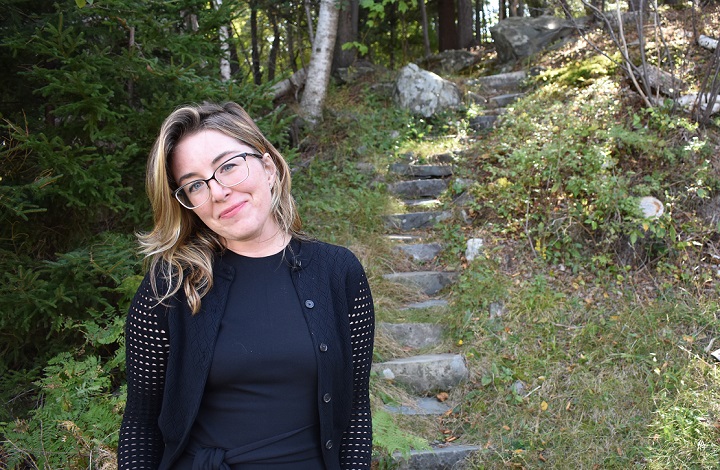 On the importance of making research transparent and accessible
On the importance of making research transparent and accessible
From construction to repairing circuit boards to promoting a circus, new Mount librarian Sandra Sawchuk has always felt strongly about saying “yes” to new opportunities and seeing where they lead. “Opportunity knocks and I answer the door every time,” she says.
Born and raised in Edmonton, Alberta, Sandra worked in a variety of roles before completing her Bachelor of Education degree at the University of Alberta and a dual degree program including a Master of Library and Information Studies (MLIS) and a Master of Arts in Humanities Computing.
It was ultimately her exploratory and open attitude that led her into librarianship – a career she had never considered growing up.
“I have been a serendipitous explorer of post-secondary education,” she says. “I never had a destination and I never knew what I wanted to be until I was in my thirties. I realized everything I had done in post-secondary and even in high school was leading me to librarianship and it was really liberating.”
“Data liberation” and the role of the digital librarian
While completing her MLIS, Sandra entered a random draw to attend a conference in Vancouver. She had always loved Vancouver and saw it as an opportunity to explore the city and to make some connections with people in the industry. The conference turned out to be a life changing event, where Sandra was introduced to the world of digital librarianship. “There were librarians at the conference who were doing things that I didn’t even know existed in the field. They were talking about the philosophy of information and using Excel spreadsheets to capture and analyze data.”
During the conference, Sandra was also introduced to the Data Liberation Initiative (DLI) – a group commissioned by Statistics Canada to provide data librarian services to post-secondary institutions across Canada. The purpose of the initiative is to improve access to Canadian data resources. Sandra credits the conference as being a springboard into her career as a digital librarian.
“I wouldn’t be where I am right now if it wasn’t for the librarians in the Data Liberation Initiative. I learned the role data librarians play in supporting researchers in the data management process,” she says.
Thanks to some connections she made during the conference, Sandra secured a part-time job as a Student Data Assistant for the Digital Initiatives unit at the University of Alberta Libraries during the latter part of her studies. Through this experience, it became clear to Sandra that her interests in technology, education and information could come together in the form of a career.
Fast forward two years and Sandra came across the job posting for the Mount, which she felt was written for her. “The job description incorporated everything I had been doing to prepare myself in post-secondary and would allow me to use my passion for education and technology. I think the job kind of chose me.”
In her role at the Mount, Sandra is the main library liaison with the Faculty of Education and the Child & Youth Studies Department. She supports faculty and students in navigating and sharing research at every step in the research process. A secondary part of Sandra’s role is to make the digital experience of the library as functional, enjoyable and easy as possible. She is currently reviewing the library website to help students and faculty navigate the products and services offered.
A third pillar of Sandra’s role involves completing research on data management in a small institution. Sandra works closely with faculty members in planning, collecting and organizing their data in a cohesive and accessible way.
“Part of my job is identifying ways to make data discoverable in the same way a book is discoverable in a library. The research data needs to be handled in a way that is findable, accessible, interoperable and reusable,” she says. She is currently working with various departments at the Mount on data stewardship and conducting research responsibly in the short and long term. Her hope is to formalize a policy around research data management.
Information overload – and the role of the librarian
When asked why someone should consider library studies, Sandra believes the skills acquired in this area are more important than ever.
“Information literacy is incredibly important. We have never had more access to information in the history of humanity. It is not all accurate, nor is it all good, so how do we know what is real? We have to be able to critically interpret and analyze the information we are being bombarded with. I think the underlying mission of most librarians is to help increase information literacy.”
It is for this reason that Sandra has loved making the transition to a smaller university, where she has the ability to work more closely with students, faculty and staff to discuss the importance of conducting research in an open and transparent way.
“It’s not just about publishing a paper. If you collect data, it’s important to let people see that and discover it for themselves,” she says. “There are biases that seep into how we translate information. Making the research process open and accessible allows for research to be more transparent and ultimately better.”
Sandra’s desire to help others has been a common thread throughout her life. When asked what words she lives by, she references the Girl Guide motto and reflects on her own path. “Always be prepared. Arm yourself with knowledge. It’s ok to not have a plan, but explore, investigate, learn and eventually you will end up where you want to be.”
And, of course, always answer the door when opportunity knocks.